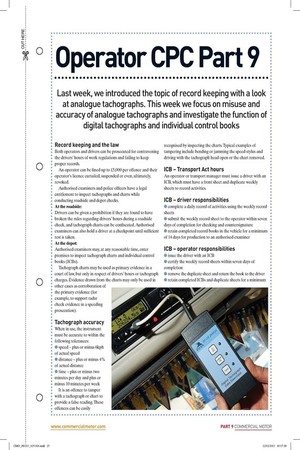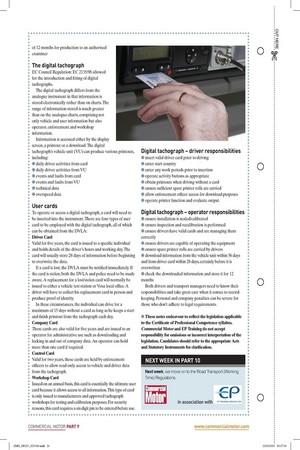erator CPC Part 9
Page 17

Page 18

If you've noticed an error in this article please click here to report it so we can fix it.
Last week, we introduced the topic of record keeping with a look at analogue tachographs. This week we focus on misuse and accuracy of analogue tachographs and investigate the function of digital tachographs and individual control books Record keeping and the law Both operators and drivers can be prosecuted for contravening the drivers' hours of work regulations and failing to keep proper records.
An operator can be fined up to £5,000 per offence and their operator's licence curtailed, suspended or even, ultimately, revoked.
Authorised examiners and police officers have a legal entitlement to inspect tachographs and charts while conducting roadside and depot checks.
At the roadside: Drivers can be given a prohibition if they are found to have broken the rules regarding drivers' hours during a roadside check, and tachograph charts can be confiscated. Authorised examiners can also hold a driver at a checkpoint until sufficient rest is taken.
At the depot: Authorised examiners may, at any reasonable time, enter premises to inspect tachograph charts and individual control books (ICBs).
Tachograph charts may be used as primary evidence in a court of law, but only in respect of drivers' hours or tachograph charges. Evidence drawn from the charts may only be used in other cases as corroboration of the primary evidence (for example, to support radar check evidence in a speeding prosecution).
Tachograph accuracy When in use, the instrument must be accurate to within the following tolerances: • speed — plus or minus 6kph of actual speed • distance — plus or minus 4% of actual distance • time — plus or minus two minutes per day and plus or minus 10 minutes per week It is an offence to tamper with a tachograph or chart to provide a false reading. These offences can be easily recognised by inspecting the charts. Typical examples of tampering include bending or jamming the speed stylus and driving with the tachograph head open or the chart removed.
ICB - Transport Act hours An operator or transport manager must issue a driver with an ICB, which must have a front sheet and duplicate weekly sheets to record activities.
ICB - driver responsibilities • complete a daily record of activities using the weekly record sheets • submit the weekly record sheet to the operator within seven days of completion for checking and countersignature • retain completed record books in the vehicle for a minimum of 14 days for production to an authorised examiner ICB - operator responsibilities • issue the driver with an ICB • certify the weekly record sheets within seven days of completion • remove the duplicate sheet and return the book to the driver • retain completed ICBs and duplicate sheets for a minimum of 12 months for production to an authorised examiner The digital tachograph EC Council Regulation: EC 2135/98 allowed for the introduction and fitting of digital tachographs.
The digital tachograph differs from the analogue instrument in that information is stored electronically rather than on charts. The range of information stored is much greater than on the analogue charts, comprising not only vehicle and user information but also operator, enforcement and workshop information.
Information is accessed either by the display screen, a printout or a download. The digital tachograph's vehicle unit (VU) can produce various printouts, including: • daily driver activities from card • daily driver activities from VU • events and faults from card • events and faults from VU • technical data • overspeed data User cards To operate or access a digital tachograph, a card will need to be inserted into the instrument. There are four types of user card to be employed with the digital tachograph, all of which can be obtained from the DVLA: Driver Card Valid for five years, the card is issued to a specific individual and holds details of the driver's hours and working day. The card will usually store 28 days of information before beginning to overwrite the data.
If a card is lost, the DVLA must be notified immediately. If the card is stolen, both the DVLA and police need to be made aware. A replacement for a lost/stolen card will normally be issued to either a vehicle test station or Vosa local office. A driver will have to collect his replacement card in person and produce proof of identity.
In these circumstances, the individual can drive for a maximum of 15 days without a card as long as he keeps a start and finish printout from the tachograph each day.
Company Card These cards are also valid for five years and are issued to an operator for administrative use such as downloading and locking in and out of company data. An operator can hold more than one card if required.
Control Card Valid for two years, these cards are held by enforcement officers to allow read-only access to vehicle and driver data from the tachograph.
Workshop Card Issued on an annual basis, this card is essentially the ultimate user card because it allows access to all information. This type of card is only issued to manufacturers and approved tachograph workshops for testing and calibration purposes. For security reasons, this card requires a six-digit pin to be entered before use.
Digital tachograph - driver responsibilities • insert valid driver card prior to driving • enter start country • enter any work periods prior to insertion • operate activity buttons as appropriate • obtain printouts when driving without a card • ensure sufficient spare printer rolls are carried • allow enforcement officer access for download purposes • operate printer function and evaluate output Digital tachograph - operator responsibilities • ensure installation is sealed/calibrated • ensure inspection and recalibration is performed • ensure drivers have valid cards and are managing them correctly • ensure drivers are capable of operating the equipment • ensure spare printer rolls are carried by drivers • download information from the vehicle unit within 56 days and from driver card within 28 days, certainly before it is overwritten • check the downloaded information and store it for 12 months Both drivers and transport managers need to know their responsibilities and take great care when it comes to recordkeeping. Personal and company penalties can be severe for those who don't adhere to legal requirements.
• These notes endeavour to reflect the legislation applicable to the Certificate of Professional Competence syllabus. Commercial Motor and EP Training do not accept responsibility for omissions or incorrect interpretation of the legislation. Candidates should refer to the appropriate Acts and Statutory Instruments for clarification.







































